What Is Marketing Channel? Why Marketing Channel Is Important?

- What is Marketing Channel?
- Why Are Marketing Channels Important?
- Factors Determining the Marketing Channels
- Functions of Marketing Channels
What is Marketing Channel? Multiple marketing channels are used to introduce a product to the market. Distribution channels refer to the process of getting a product from a manufacturer to a retailer.
In addition, the marketing channel is commonly referred to as a product distribution mechanism in which a corporation may quickly transfer its goods from one person to another across many means.
A company’s marketing channels are crucial. The success of a manufacturer’s business is largely determined by the distribution channels via which it sells its goods.
However, with so many alternatives, it’s easy to become overwhelmed. When it comes to any plan, you want to make sure that your time and money are spent on the most effective channels and approaches.
However, if you don’t have a good understanding of what will work best for your company, it’s easy to allow your fear and confusion keep you from getting started.
What is Marketing Channel?
A marketing channel is a group of people, organizations, and activities that collaborate to move things (products and services) from point of origin to point of consumption.
A marketing channel’s main goal is to establish a link between the company that makes a product or service and potential clients who might wish to buy it.
There are four fundamental sorts of marketing channels for physical products.
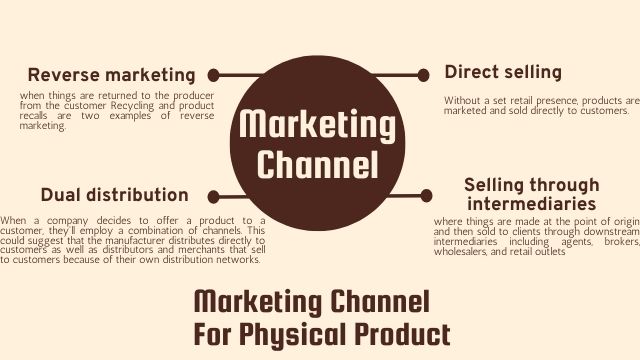
Digital marketing campaigns are a sort of direct selling campaign that uses a variety of channels to efficiently market to prospects, nurture them through the sales funnel, and promote revenue growth and target achievement.
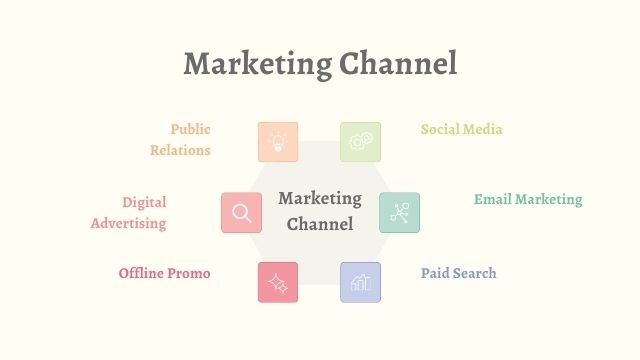
Why Are Marketing Channels Important?
When a company is planning to launch a new products and services, it must first design and specify the marketing mix that will be utilized to promote the product in the marketplace.
The four P’s of marketing must be accounted for in a successful marketing mix.
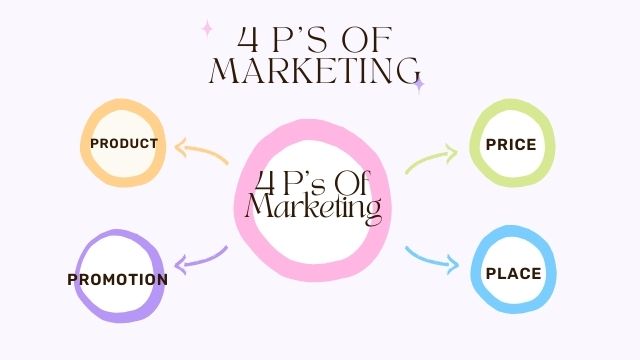
The product is the most important aspect of the marketing mix. To be successful, a company must provide a product that customers want to buy because it meets their needs and provides the characteristics they need.
It should be designed to provide a better customer experience while also effectively differentiating itself from competitors with value-added features.
Pricing is the second factor to consider. The company must charge a price that is reasonable in comparison to the product’s worth.
Pricing should be competitive with similar products on the market, while also taking into account distinctive qualities and the value that prospective purchasers may place on them.
Understanding marketing channels is critical when it comes to the final two factors, location and promotion.
To satisfy the third marketing mix factor, place, a company must first determine where buyers are looking for their products and then work to make them available there.
Customers will seek out numerous technological companies’ items either online (direct selling) or through a retailer (selling through intermediaries).
The third component of the marketing mix, promotion, is concerned with determining the optimal channels via which a company can convey product messaging to a specific audience.
Because direct selling organizations do not rely on retailers or wholesalers to push sales on their behalf, promotion is more vital. Organizations that offer their goods on the internet.
Factors Determining the Marketing Channels
Certain aspects relating to the product, the company, the rivals, the market, and the environment influence the choice of an acceptable distribution channel for a certain product.
Let’s have a look at the following categories to learn more about these factors:
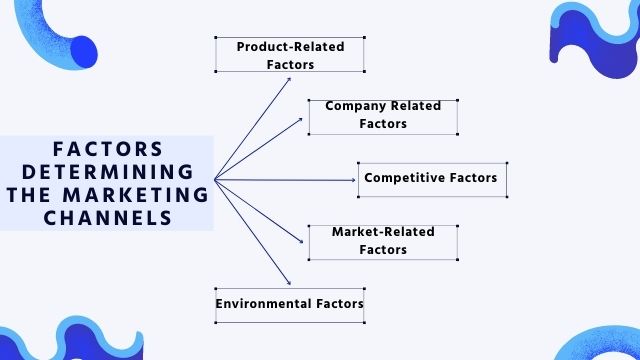
Product-Related Factors
The characteristics, specs, nature, usage, value, and durability of the product all play a part in the marketing channels chosen. Let’s have a look at the following factors:
- Nature of the Product
If the product is a generic, generally used item such as cosmetics, it will require a more extensive distribution route. A shorter channel is required for products that are customized or have a small number of consumers, such as industrial machinery.
- Perishability
Perishable commodities must be offered through a shorter distribution channel. Non-perishable goods, on the other hand, can be distributed over a longer period of time.
- Product Unit Value
If the product is of low value, it can be easily disseminated over a longer channel; nevertheless, producers prefer a shorter channel for products that are expensive and valuable.
- Product Complexity
A shorter channel is required if the product is difficult to operate and includes technical specifications. The items that are available.
Company Related Factors
The financial situation, objectives, privacy policies, and amount of management of the organization all influence the marketing channel chosen:
- Finance Available
If a company is financially sound, it can open retail stores for a shorter distribution channel, or it can opt for a longer marketing channel.
- Core Competency
A manufacturing company that focuses on its core capability of producing items will have little interest in selling. As a result, it might choose a longer marketing route.
- Degree of control
If the company wishes to control its sales and the market segment to which it caters, a shorter channel will be preferred. Companies that do not have a lot of control over their products want a lengthier distribution channel.
Competitive Factors
The competitors affect the company’s decisions related to the selection of marketing channels in the following ways:
- Competitor’s Distribution Channel
Companies may follow their competitors’ lead and use the same distribution channel as they employ.
- Distribution Policy
Some businesses have a specific distribution policy that they follow. Companies that engage in multi-level marketing (MLM) normally follow a chain marketing strategy.
Market-Related Factors
The market is the location where clients are serviced. As a result, it is critical in establishing the channel type for every product. Let’s take a closer look at these elements:
- Market Size
When a corporation needs to reach a large number of clients, the longer channel is the best option. If the company just has to serve a few clients, it can choose a narrower distribution channel.
- Geographical Concentration
If the company’s potential clients are spread out throughout a large geographic area, it can contact them via a longer channel. For purchasers who live in a small area, the shorter channel will be favored.
- Quantity Purchased
A shorter channel is appropriate for products purchased in bulk by a small number of customers, whereas a longer channel is appropriate for things purchased in modest quantities by a large number of clients.
Environmental Factors
Every firm functions in a context in which it must cope with legal duties as well as economic realities. The following are some of these factors:
- Legal Environment
The government imposes specific legal limits on trade activity, which has an impact on channel selection. Weapons sales, for example, cannot be made through a longer channel.
- Economic Conditions
When a country is through a recession or depression, manufacturers prefer to cut their distribution costs by opting for a shorter marketing channel.
Functions of Marketing Channels
The initial goal of marketing channels is to make products or services available to potential buyers. The above-mentioned factors determine which channel is chosen.
People or organizations who operate as a link between manufacturers and customers are known as intermediaries. They perform a variety of activities that benefit both businesses and customers.
The following functions are described in detail:
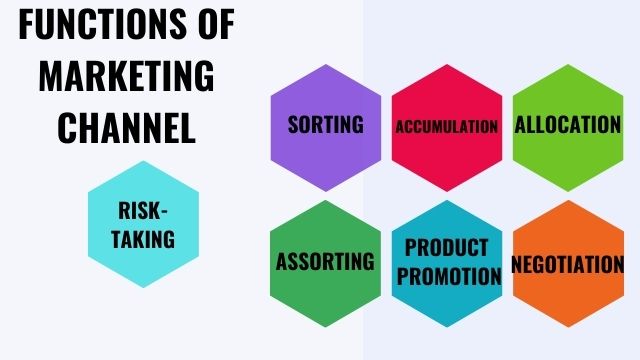
- Sorting
The intermediaries buy goods from a variety of manufacturers and sort them into categories based on quality, features, and size.
- Accumulation
Marketing channels enable consistent supply and circulation of commodities in the market since the middlemen participating in the process are responsible for maintaining adequate stock levels.
- Allocation
Goods are made in large amounts, but clients prefer to buy only a small amount. Here comes the role of the middleman, who divides the bulk into little packages based on the needs of the buyers.
- Assorting
Buyers can choose from a wide range of products because middlemen purchase goods from manufacturers or suppliers in several places and make them available to customers in one location.
- Product Promotion
The middlemen participating in the distribution channel may promote the sale of a particular product directly or indirectly by a special display, loyalty programs, additional discounts, organizing sales, and so on.
- Negotiation
A middleman is a person who negotiates for a product’s price, proportion, quality, after-sale service, guarantee, and other factors with both the manufacturer and the consumer.
- Risk-taking
The middlemen, i.e. wholesalers and retailers, must carry the risk of products expiring, breaking, spoiling, or being damaged. These dangers are present even during shipping and warehousing.
Multichannel vs. Omnichannel
In marketing, the terms multichannel and omnichannel are frequently used. First, let’s look at the definitions of these terms:
Multi channel Marketing
When you are using upwards of one method to reach customers, it’s called multi-channel marketing.
Omnichannel Marketing
It refers to marketing which specialize in producing consumer experiences across numerous channels, it is also referred to as multichannel marketing.
What should be Your Channel for Marketing?
Your marketing strategy is mostly determined by the type of business you run and the demographics of your target market.
As you can see, different marketing channels offer a variety of benefits, but most firms can find a way to include numerous channels into their marketing campaigns to achieve their objectives.
Furthermore, because your audience is different, using numerous channels to generate many points of contact nurtures leads and increases conversions.
However, instead of focusing on every new channel, you should focus on the correct channel to maximize your business’s growth.
The mobility of products or services from producing units to consumers is ensured via marketing channels. The manufacturer will not be able to obtain the desired value of his product without proper distribution.
Read Also: Direct Selling: Tips For Direct Selling
Conclusion
Marketing channels ensure that commodities and services are mobile from the point of manufacture to the point of consumption. The manufacturer will not be able to attain the target value of his product without efficient distribution.

Q-What is an example of a marketing channel?
A- Businesses use marketing channels to get their products and services in front of the right people. The people who will buy and use a product are the correct audience for it. Direct marketing channels include things like direct mail initiatives.
Q- Is social media used for marketing?
A- When compared to traditional media, adopting social media as a marketing channel necessitates major changes to your communication strategy.
Q- What are business channels?
A- Customer Relationships and Channels The business model relies heavily on channels. They are the means by which a business connects with and reaches out to its various client segments. Awareness, evaluation, purchase, delivery, and after sales are the five phases of a channel, which might be direct or indirect.
Q- What are the functions of marketing channels?
A- Gathering market information, driving demand, transporting inventories, physically distributing products, assisting transactions, and providing after-sale service are all roles that marketing channels do. Some of these functions are self-explanatory, but others require some explanation.
Q- What does it mean to have a channel strategy?
A- A vendor’s channel strategy is their approach for getting a product or service from the manufacturer to the end user.






